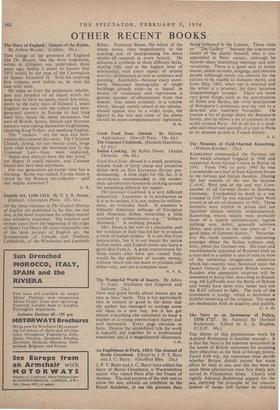The Navy as an Instrument of Policy, 1558-1727. By Admiral
Sir Herbert Richmond. Edited by E. A. Hughes. (C.U.P. 60s.)
THE theme of this posthumous work by Admiral Richmond is familiar enough : it is that the Navy is the supreme instrument in the hands of British statesmen for attaining their objectives in the field of foreign policy. Faced with war, the statesman must decide whether Britain should mount her main effort by land or sea, and this has been so since these alternatives were first dimly per- ceived in Elizabethan times. Clearly and rightly Admiral Richmond argued for the sea, carrying the principle of the concen- tration of forces still further by insisting
that even at sea the whole effort should be directed on the single decisive objective and not dispersed among a number of under- takings. He reviewed in detail the naval campaigns throughout the period the volume covers, always seeking to show how far the statesmen of the time understood and fol- lowed this fundamental rule. The problem is not, however, as simple as he would have had us believe. There were campaigns, such as Marlborough's, where he admitted special Circumstances could modify the rule ; but circumstances were always special and, as he offered no criterion of what justified a Modification, he is in some danger of tPpearing to have judged purely by whether it succeeded or failed.
The draft of this volume was completed
some time before 1942, and there arc notes for a second continuing the story to 1918. Admiral Richmond obviously used this Material for the Ford Lectures he delivered at Oxford in 1943, for they presented the same theme at shorter length but in a more fully reasoned way. Valuable as this earlier version is for its more detailed survey, the fact of his never publishing it suggests that he considered his Ford Lectures, later pub- lished under the title of Statesmen and Sea- Power, to be a bitter statement of his views.



































 Previous page
Previous page